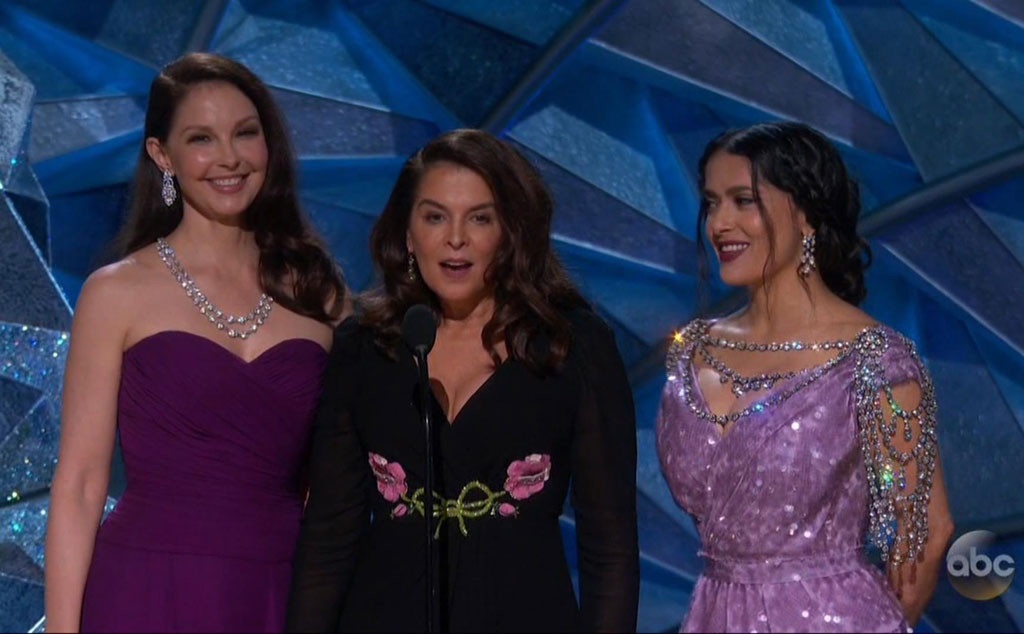_Featured image: Ashley Judd, Annabella Sciorra, and Salma Hayek at the 2018 Oscars._While words like “equality,” “diversity,” “inclusion,” and “intersectionality” might sound nice, they don’t address the root problem of patriarchy and they erase feminism’s real aims. On International Women’s Day, let’s remember what feminism is really about. by Meghan Murphy / Feminist Current
On Sunday night at the Oscars, the big #MeToo moment was brought to us by Ashley Judd, Salma Hayek, and Annabella Sciorra. While these women have been incredibly brave in sharing their stories of abuse and harassment in Hollywood, it seems the industry is still dictating the message.
“This year many spoke their truth and the journey ahead is long but slowly a new path has emerged,” Sciorra said. And while a new path has indeed emerged, as women have banded together to speak out against men’s abuse in numbers I have never witnessed in my lifetime, I’m left wondering where that path will lead us, without a clear understanding of the issues at hand.
“The changes we are witnessing is being driven by the powerful sound of new voices, of different voices, of our voices, joining together in a mighty chorus that is finally saying, ‘Time’s up,’” Judd said. “And we work together to make sure the next 90 years empower these limitless possibilities of equality, diversity, inclusion, intersectionality.”
But what is truly powerful about the voices leading #TimesUp and #MeToo was strangely excluded from Judd’s list of “limitless possibilities”: women.
This past year has been made possible only by the feminist movement. Our understanding that sexual assault and sexual harassment are bad things is a direct result of the work women have done to show how men’s power is systemic and how their violence is normalized because women are constructed as less-than-human under patriarchy. Feminists’ work analyzing and articulating sexual objectification underlies what preceded this mass conversation, allowing comments about grabbing women “by the pussy” to be seen as a literal manifestation of that objectification. So to hear three women who took great risks in speaking out about what Harvey Weinstein did to them, in order to contribute to a larger conversation about how men’s dehumanization of women leads to violence and to hold men accountable for behaviour they’ve gotten away with for centuries, because of a system that institutionalizes men’s dominance, without mentioning either women or the feminist movement was shocking to me.
While all good and progressive concepts, neither “equality,” nor “diversity,” nor “inclusion,” nor “intersectionality” will stop men’s violence. None of these vague, gender-neutral terms address the system that offers up women as things to be used and abused by men. Indeed, these terms have been used to usurp the women’s liberation movement, in large part because of their lack of clarity and political investment in ending patriarchy, specifically.
“Diversity,” for example, can easily be (and, consequently, has been) manipulated to defend the idea that simply allowing more diverse people and bodies to be objectified will resolve any problematic aspects of, for example, the beauty industry or sex industry. Hugh Hefner touted himself as a champion of diversity for allowing a black woman to sell his magazines for him, making Jennifer Jackson Miss March in 1965. He was similarly self-congratulatory (and celebrated) for putting trans model Caroline “Tula” Cossey in the magazine in 1991. In an attempt to escape their sexist reputation, American Apparel, a company then-run by a man famous for sexually harassing and exploiting his young female staff, launched “The Next Big Thing,” a contest to find plus-size models.
Clearly, these are not people or companies invested in women’s liberation… Yet, it’s easy for them to pose as allies when we offer up vague, gender-neutral terms to replace more accurate ones. Similar to “diversity” and “equality,” terms like “body acceptance,” “strength,” and “empowerment” have all been co-opted to further sell porn culture and objectification for the same reason: lack of specificity.
What’s so great about the term “feminism” is that it is specific about its focus on women and it’s opposition specifically to patriarchy. Though many attempt to water-down its radical roots and and meaning, the term “feminism” is not in fact about “equality.” Women do not want equal access to misogynist systems, we want an end to those systems.
The notion that “rights” and “equality” for marginalized people will be achieved by fitting them into a patriarchal vision of the world is exactly the problem with these words. “Including” women of colour or women who don’t fit conventional standards of beauty in pornography or other misogynist industries does not address the problems with those industries.
While it is necessary for Hollywood to address it’s white-centric, male-centric blind spots, it’s disappointing to see what is truly a feminist movement erase its roots and radical aims. What’s even worse is that I’m certain this was done in order to avoid making those not on board with the feminist project uncomfortable. In other words, these actresses were likely concerned about alienating men in the room.
But there’s a very good reason that feminism makes men uncomfortable: it centers women, and refuses to cater to male feelings and preferences. For once, we have a movement that is about us and us alone. Altering the language to avoid the uncomfortable feelings men might have about their power being named and challenged strikes me as contrary to our goals.
Feminists have long championed the mantra, “name the problem.” If anything, that is what #MeToo has done. Let’s not stop now.
